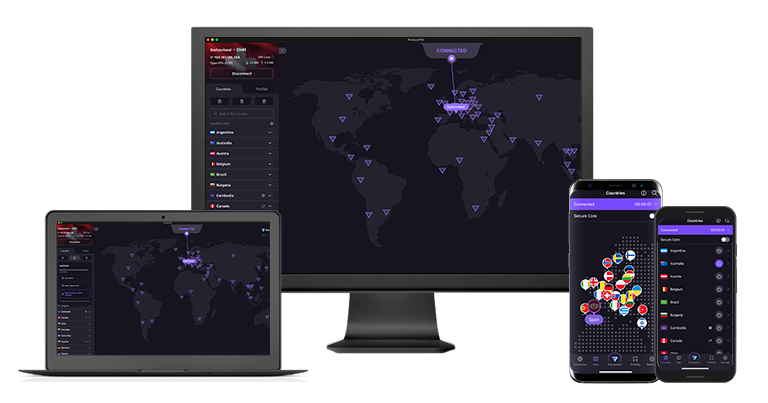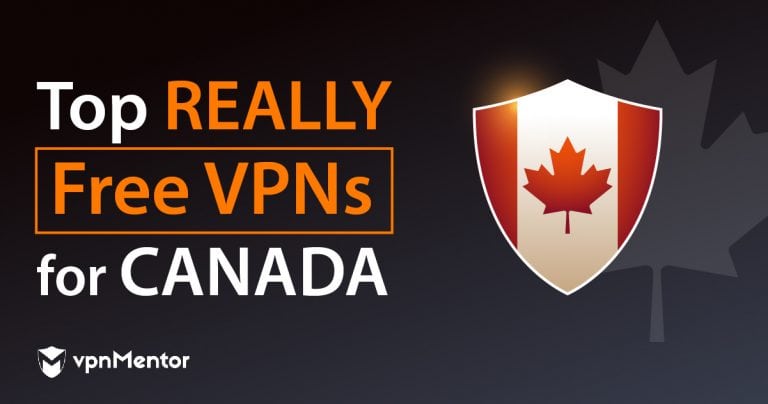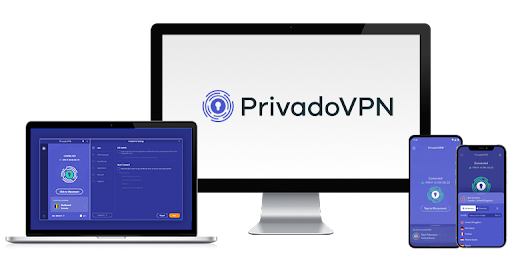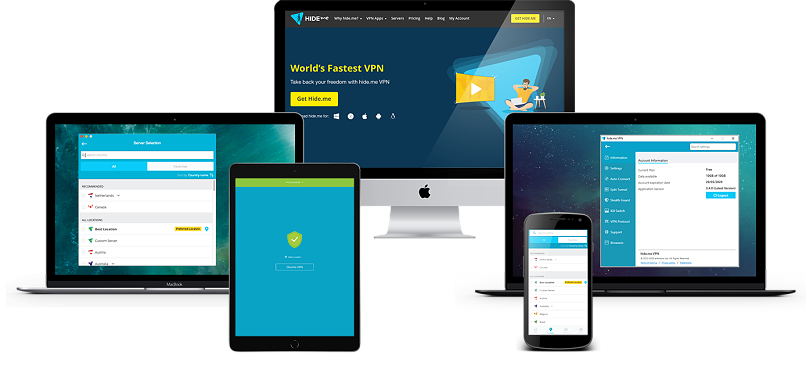3 Best Free Canada VPNs That Are Fast & Safe to Use (2026)
- Quickly Compare the Best Free Canada VPN Features
- Do You Need a VPN for Canada in 2026?
- A Complete Analysis of the Best Free VPNs for Canada in 2026
- How We Selected the Best Free Canada VPNs
- Free vs. Paid VPNs: Which One Is Best for Using in and Outside of Canada?
- Which Free VPNs for Canada Should You Avoid?
- FAQs
- Conclusion
Using just any free VPN for Canada won’t protect you from the issues with privacy and surveillance happening around the country. Locals and tourists also experience challenges with finding secure, free apps that work with content sites, given how Canadian media laws greatly limit access to international libraries.
The problem isn’t just that free VPNs aren’t safe, but that they are greatly restricted in bandwidth, data, and servers, making them unreliable for serious browsing. For that reason, sometimes you may need a paid service (even a cheap one would do) for things like streaming and torrenting in Canada.
After vetting dozens of popular free VPNs, we've shortlisted the most secure ones for use in Canada. These can take away the stress of worrying about your data being stolen or monitored by the government, with Canada being part of the Five Eyes Alliance.
Quickly Compare the Best Free Canada VPN Features
Each of our top free VPN selections for Canada offers unique competitive advantages that could make one more likable over the rest. In the table below, I’ve summarized free features that you can expect, such as data limits, server coverage in Canada and beyond, speed, data protection, and more.
Do You Need a VPN for Canada in 2026?
Canada is undergoing rapid changes, which have pushed internet users to adopt VPNs. The digital environment is closely monitored by internet providers and third parties online, so VPNs help to protect users. Laws such as the Online Streaming Act (previously Bill C-11), meant to reduce copyright infringement, imply that regulatory authorities collect information about users whenever they access media online.
Plus, Canada has minimum data retention thresholds for firms operating within its jurisdiction, and is also part of the 5/9/14 Eyes Alliances, sharing intelligence on their citizens with other countries. It leaves residents and Canadians living abroad concerned about where their private information might end up.
A VPN helps to secure browsing activities in Canada or elsewhere by encrypting traffic and masking your IP address, minimizing the chances of data brokers collecting information on you. That means that whenever or wherever you access sites online and on WiFi hotspots in Canada, there’s minimal to no trace of data to give away details of your searches and web visits.
Connecting to different VPN server locations also enables Canadians to safely access websites anywhere (whether they're residing in the country or traveling abroad). A VPN is also necessary for safe torrenting in Canada. It prevents unnecessary tracking and can even stop malware and phishing links deployed by risky sites to steal your information.
A Complete Analysis of the Best Free VPNs for Canada in 2026
1. Proton VPN — Offers Unlimited Data for Non-Stop Browsing in and Outside Canada

Tested January 2026
| Best Feature | Doesn’t limit data on the free version |
|---|---|
| Server Network | Free servers in 5 countries, including Canada |
| Security and Privacy | Robust cryptography with strong key exchange, and is based in Switzerland |
| Monthly Data | Unlimited to browse and stream as much as you like |
Proton VPN offers free users unlimited data to browse in Canada. That means your streaming and file-sharing won't be interrupted midway because you've exhausted the preset limits. In our tests, Proton could stream consistently without any buffering whatsoever, thanks to the stable speeds to complement the unlimited data allowance. Our connections to Canada clocked around 20Mbps, which was just enough to support watching in HD.
 Proton VPN automatically connects you to the fastest free server location on first trial
Proton VPN automatically connects you to the fastest free server location on first trial
Beyond offering free apps for iPhone, Android, and desktop, you can also use Proton VPN with devices like Fire TV Stick. Plus, router compatibility gives you the flexibility to secure more devices on your network, since the free version is restricted to one device at a time. It offers free servers in Canada, the US, Mexico, the Netherlands, Singapore, and Japan.
Moreover, Proton VPN gives you the peace of mind uncommon with most free providers. Its no-logs policy has been independently verified to be transparent, and the Swiss headquarters leaves less to worry about your information being shared.
One drawback was that I couldn’t randomly switch servers and change IP addresses on the free app. However, I was still able to do so after waiting periods of roughly 10 minutes.
Useful Features
- Anti-censorship features. The app offers Stealth Protocol and Alternative Routing settings, both of which help to disguise your VPN traffic and avoid detection on platforms and networks that block VPN traffic in Canada, such as school WiFi.
- Open source apps. Anyone can inspect the Proton VPN developer code on public repositories such as GitHub, clearing any further doubts about its transparency.
- WireGuard. This is one of the most reliable and secure protocols available, and you can even use it to set up on the router or Linux OS.
- Unlimited monthly data
- Reputable privacy practices and features
- Fast speeds near and far
- Only nearby server connection
- No P2P support
2. PrivadoVPN — Streamer-Friendly Free Canada Servers to Securely Access Content From Anywhere
| Best Feature | Supports streaming in and outside Canada with free servers |
|---|---|
| Server Network | Free servers in 13 countries, including Canada |
| Security and Privacy | In-app kill switch and jurisdiction in Switzerland |
| Monthly Data | 10GB per month to securely browse on any device |
PrivadoVPN doesn’t restrict streaming on free servers in Canada and around the world. It safely accessed Netflix and BBC iPlayer during our tests, and the local team confirmed that it worked with sports and content sites like DAZN Canada, TSN, CTV, and CBC Gem. PrivadoVPN worked with all of these platforms on the first try when we left the app on the default Automatic protocol settings. Impressively, the free version can be used for torrenting as well.
 There was no video buffering when we used PrivadoVPN's servers
There was no video buffering when we used PrivadoVPN's servers
But unlike with Proton VPN, there was a 10GB monthly data limit that stood in my way of streaming. It meant we could only use the app for roughly 5 to 6 hours before running out of data. However, PrivadoVPN gave us really fast speeds in locations far away, like India, dropping just 44% (from 244Mbps to 137Mbps). It’s a good option if you want a fast VPN for Canada, but you can also set the VPN to connect to the nearest location or a low-latency server by default.
PrivadoVPN hasn’t recently undergone any private audits, which is a letdown. However, it has a zero-logs policy and is also based in Switzerland, outside of the 5/9/14 Eyes jurisdiction to which Canada is a member.
Useful Features
- SmartRoute. This setting allows you to tunnel only specific websites, apps, and IP addresses on the VPN, which can help to conserve data and minimize power drainage on mobile devices.
- Change app language. PrivadoVPN can be used for Canada in English or French, plus tens of other languages, depending on what you find most convenient.
- Free servers in 13 locations
- Full suite of security features
- Simple one-click activation
- Restricted to 10GB per month
- No browser extensions
- Only one device connection
3. hide.me — Robust Security Settings to Tailor Your Privacy Preferences for Canada
| Best Feature | Adaptable apps to easily adjust protection over Canadian networks |
|---|---|
| Server Network | Free servers in 8 countries, including Canada |
| Security and Privacy | IPv4 and IPv6 leak protection and jurisdiction in Malaysia |
| Monthly Data | Unlimited data to surf the net without restrictions |
hide.me is secure with customizable settings to tailor your protection in Canada. You can opt to secure both IPv4 and IPv6 traffic, and the built-in StealthGuard allows routing for only specific apps that need protection, while IP-sensitive apps like banking or remote work use a regular connection. We tested 16 hide.me servers, and it secured our connection without leaking IP or DNS information, making it reliable for privacy in Canada.
 You can upgrade to a paid plan to get access to more features
You can upgrade to a paid plan to get access to more features
I could easily choose from different hide.me protocols whenever the connection performance wasn't as good as I had expected. No signing up is required to use hide.me, and it's headquartered in Malaysia, both of which are factors that help to enhance user data integrity.
hide.me has unlimited data like Proton VPN, but you can't change servers after using up 10GB of data per month. It doesn't offer free Canadian servers, but you can safely connect to the US, the UK, France, plus a few more locations.
Useful Features
- Free customer support. Even non-paying hide.me users are allowed to chat with support staff, should you run into issues and need technical assistance.
- Tons of customizable security features
- Unlimited monthly data
- Free servers in 8 locations
- Capped speeds
- No server selection after 10GB of data
How We Selected the Best Free Canada VPNs
We tested each VPN's ability to provide secure connections to and from Canada. We checked for server availability in the country or nearby, then evaluated the speed performance for activities like streaming, torrenting, and gaming. The chosen VPNs have trustworthy privacy and security against scrutiny by Canadian internet providers, and they didn’t expose our IP or DNS details when we tested them several times for leaks.
Many free VPNs aren’t compatible with platforms outside mobile, PC, and maybe browsers. Therefore, it’s important to confirm if the free service can be used with routers, smart TVs, or gaming consoles, if these are the main devices where you want to use the VPN.
Free vs. Paid VPNs: Which One Is Best for Using in and Outside of Canada?
Free VPNs can be used in Canada, but most aren’t safe and are too restricted to rely on. They have speed, data, and server limitations, so they can only be used for light net surfing, like maybe browsing news pages and regular apps, but not serious things like high-definition streaming or large file transfers.
Good paid VPNs are less hassle to use for Canada compared to free ones. They invest in robust security infrastructure to provide users with good value for their money. You get much better connections in Canada and several other countries without speed or bandwidth caps, and servers are well optimized for content streaming, gaming, and torrenting activities. Also, the contracts are much more trustworthy because the motivation to sell information is much less (although some still do).
With free VPNs, there’s a great risk of being tracked with every step because most providers want to collect users’ data. As such, they’re not recommended for Canada since there isn’t solid privacy protection going on. Sometimes the free VPNs are just apps that are being used to distribute malware, so it’s very necessary to be vigilant with most.
Which Free VPNs for Canada Should You Avoid?
A number of free VPN apps already have a bad reputation for compromising privacy and security in exchange for providing a free service, and they should be avoided. Here are just a few examples.
- Hola VPN. This is essentially a peer-to-peer network, meaning you share your network with other users. So, if someone using your network were to do something illegal, you may be held liable due to a shared IP address.
- UrbanVPN. Like Hola, this is also a P2P service that uses your device resources and logs sensitive information for sharing with affiliated marketing companies.
- TurboVPN. It logs your browsing data and shows too many ads that can be embedded with malware or trackers.
- Betternet VPN. The VPN lacks essential security features like leak protection and has a questionable privacy policy.
- FreeVPN Chrome extension. This has been marked as a spyware that captures screenshots of pages and sensitive data of users and uploads it to backend private servers.
FAQs
Conclusion
To safely use a free VPN in Canada, you need to prioritize things such as how it secures traffic and masks your IP address without leaving room for third parties to compromise your privacy. The practicality of the free service also depends on factors such as speed and data allowance so that you can browse with fewer limitations. From all the options available, Proton VPN is the most well-rounded free service I would recommend for Canada.






Please, comment on how to improve this article. Your feedback matters!